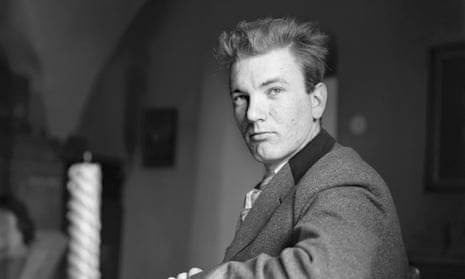In public, he could be gregarious. His charm was legendary. For the great Austrian novelist and playwright Thomas Bernhard, life was a kind of production. But as his half-brother Peter Fabjan remembers him in his new book, A Life Alongside Thomas Bernhard: A Report, published in German in January, there was another side to Bernhard. “My life was a life with a phantom – indeed a demon – at my side,” he writes.
A Top 10 bestseller in Austria, and labelled a must-read by Germany’s Die Welt, Fabjan’s book marks what would have been Bernhard’s 90th year, were it not for his premature death in 1989 at the age of 58. It has been widely acclaimed by critics; behind Fabjan’s sentences, Marc Reichwein wrote in Welt am Sonntag, one feels “the wounds of a sibling’s entire life”.
Bernhard was generous, self-disciplined and prolific as an artist, but among close friends and family, he was a vulnerable, wounded character who flitted between “affection and icy contempt”. Fabjan writes: “If Beethoven composed his Ninth Symphony in a state of absolute deafness, then Bernhard worked in a state of inner deafness when it came to having a sense of his own being.”
In order to feel, the confrontational Bernhard always needed a sparring partner; “the reaction of a counterpart” was required “in order to light a spark in his own life”. Once his loved ones could no longer give him what he needed, Bernhard would coldly discard them, Fabjan says, describing his behaviour as that of a “vampire”.
As half-brothers, Bernhard and Fabjan’s relationship was complex. Writing of himself and his sister Susi, Fabjan recalls: “We were not allowed to give our affection. Instead, it was demanded of us and had to be proven our entire lives.” At premieres and literary parties, Fabjan played the role of the “mute companion”. He would later also play doctor: when Bernhard, who struggled with his health his whole life, was diagnosed with sarcoidosis in 1978, Fabjan, who studied medicine, became his informal personal physician. In his final years, Fabjan visited Bernhard almost daily and was at his side when he died in 1989.
Michael Hofmann, translator of Bernhard’s work into English, is not surprised by Fabjan’s recollections. “It’s surely obvious that to [Bernhard] other people were something of a resource. Something for which he had a need, periodically, but little tolerance,” he says.
Perhaps the only person who truly got close to Bernhard was Hedwig Stavianicek, a wealthy widow and his life companion. Bernhard described her as his Lebensmensch, a word whose contemporary meaning – that of the most important person in one’s life – was coined by Bernhard himself. Stavianicek was the centre of Bernhard’s life, Fabjan observes, but the relationship “remained platonic”; Bernhard was “essentially asexual.” Stavianicek’s death in 1984 hastened Bernhard’s retreat from the world. He was at her bedside when her heart gave out.
Bernhard’s final public appearance came on 4 November 1988, at the premiere of the most controversial play of his career, Heldenplatz. The three-act drama begins after a Jewish university professor, unable to withstand life in Austria, has thrown himself out of his apartment window. Opening night was subject to protests from the tabloids and rightwing groups, who claimed Bernhard had defamed Austria in a play where his characters describe it as a nation of cretins, Nazis, and antisemites: “There are more Nazis in Vienna now than there were in 1938.”
Austrian writer Josef Haslinger met Bernhard for the first time at that premiere, where he and other authors staged a counter-demonstration. “Bernhard told me that, to him, the play appeared to be a failure. He was only content with the second act,” Haslinger says, in which Austria is condemned as a nation of “six-and-a-half million morons and lunatics crying out full-throated in search of a director”. Haslinger shares Fabjan’s assessment of Bernhard: “[He] was only interested in other people when he could use them for his own purposes, literary or private. But among writers, that would not make him unique.”
The day after the premiere, Fabjan writes that Bernhard suffered a collapse due to a life-threatening lung infection. He died three months later, on 12 February 1989. While Ruth Franklin asserted in the New Yorker in 2006 that it was death by assisted suicide, contemporaneous obituaries reported, and Fabjan confirms, that Bernhard had a heart attack. “As I came into the world, so I want to depart it,” Fabjan records Bernhard as saying in his final days. “Without a fuss.”
